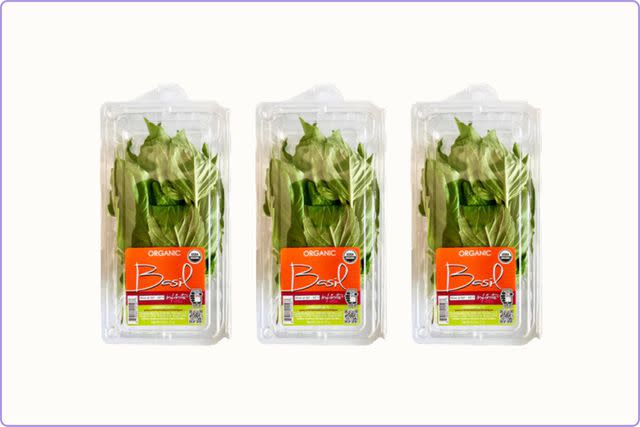Trader Joe’s Recall: Salmonella Outbreak Linked to Organic Basil Sold in 29 States
Fact checked by Nick Blackmer
The FDA and Trader Joe’s have announced a recall of organic basil over possible Salmonella contamination.
The Infinite Herbs Organic Basil was sold at Trader Joe’s stores in the District of Columbia and 29 states between February and April. So far, 12 illnesses have been linked to the contaminated product. On Friday, the recall was expanded to include Melissa's brand organic basil.
Salmonellosis is a common foodborne illness, but young children, older people, and immunocompromised people are at a higher risk of severe infections.
Certain Trader Joe’s basil is being recalled due to possible Salmonella contamination, the Food and Drug Administration (FDA) said on Wednesday.
The recalled Infinite Herbs Organic Basil was sold at Trader Joe’s stores in D.C. and 29 states across the Midwest and eastern United States between February 1 and April 6.
On Friday, the FDA announced the recall was being expanded to include Melissa's brand organic basil. That product—also supplied by Infinite Herbs—was sold in 2-ounce and 4-ounce packages at Dierberg's stores in Illinois and Missouri between February 10 and February 20, and is part of the organic basil lot that was already recalled.
A total of 12 people have gotten sick from the contaminated basil so far, and one person has been hospitalized, according to data from the Centers for Disease Control and Prevention (CDC). Those cases were confirmed in Minnesota, Missouri, Wisconsin, Georgia, Florida, New Jersey, and Rhode Island.
The FDA didn’t provide information on how the organic basil came to be contaminated with Salmonella, but said it confirmed Infinite Herbs, LLC of Miami, Florida was the supplier.
All Infinite Herbs Organic Basil—packaged in 2.5-ounce clamshell plastic containers—has since been removed from Trader Joe’s shelves, and is no longer for sale. The organic basil is also “likely past shelf-life” at this point, the FDA added, so people who purchased it have likely thrown it away by now.
However, the FDA said that “if you already bought organic basil from Trader Joe’s and removed it from the packaging or froze it and cannot tell if it was Infinite Herbs-brand, do not eat or use it and throw it away.”
Trader Joe’s added that customers who think they bought the potentially contaminated basil should throw it away or return it to any store for a refund. If people have questions, they can contact Trader Joe’s Customer Relations at 626-599-3817 or via the company’s Product Feedback form.

Trader Joe's
Latest Recall from Trader Joe’s to Pose a Health Threat
This Salmonella outbreak and related recall is the most recent in a string of recalls for the popular grocery store chain.
Earlier this year, Trader Joe’s recalled certain Steamed Chicken Soup Dumplings and its Chicken, Lentil & Caramelized Onion Pilaf over foreign material contamination.
In March, 50% Less Salt Roasted & Salted Whole Cashews were recalled due to possible Salmonella contamination. And Trader Joe’s was involved in a wider cotija cheese recall, which was linked to 23 hospitalizations and two deaths from Listeria monocytogenes infections.
These recalls due to risk of foodborne illness can be particularly concerning for consumers’ health.
Concerning Salmonella contamination, the cause of the current recall, it’s estimated that the U.S. sees about 1.35 million cases of salmonellosis—or Salmonella infections—each year. After a person accidentally ingests the bacteria, they typically start to feel sick within 12 to 72 hours. Common symptoms include diarrhea, fever, stomach pain, and sometimes nausea or vomiting.
Usually these symptoms subside after about four to seven days, and people usually recover from salmonellosis on their own. However, in certain cases, the infection can be more dangerous.
Younger kids, adults over the age of 65, and immunocompromised people are more likely to get a serious Salmonella infection. These groups may be more likely to experience severe dehydration from salmonellosis-induced diarrhea and may need intravenous fluids (IVs).
They’re also more likely to have an invasive Salmonella infection, meaning the bacteria travels out of the gastrointestinal system and into the bloodstream, brain, bones, joints, or other places around the body. From there, the Salmonella can cause meningitis, septic arthritis, and other potentially life-threatening infections.
Invasive Salmonella infections aren’t common—only about 8% of people with salmonellosis experience this—and they’re not often fatal. However, they can be; the CDC estimates about 420 people die annually from salmonellosis.
If someone suspects they might have an infection—particularly if they’ve recently consumed Trader Joe’s Infinite Herbs Organic Basil—the FDA recommends they get in touch with a healthcare provider.
People usually come into contact with Salmonella via food, though the bacteria can be harder to avoid when it has contaminated foods—including herbs like basil—that people wouldn’t normally associate with salmonellosis.
However, people can lower their risk of a Salmonella infection by adopting certain practices when cooking with raw poultry, eggs, meat, and seafood.
In order to avoid illness, the CDC recommends that people wash their hands and any cooking utensils that may have come into contact with the raw poultry or meat, and keep it separate from ready-to-eat foods. It’s also important to cook poultry, egg, meat, and seafood dishes to a safe internal temperature, and keep it refrigerated before and after cooking.
Related: You Really Shouldn't Wash Raw Chicken Before Cooking It—Here's Why, According to Experts
For more Health.com news, make sure to sign up for our newsletter!
Read the original article on Health.com.

